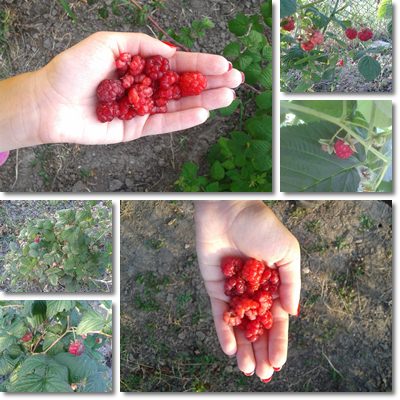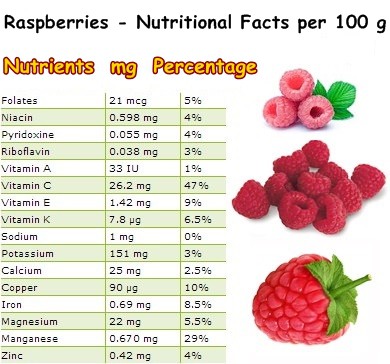Today I would like to talk to you about the properties and health benefits of raspberries. Raspberries are members of the Rubus subgenus and come in a variety of colors: red, black, yellow and even a hybrid purple variety that is currently gaining a great deal of popularity.
But color isn’t really that important when it comes to these forest fruits. What makes them a great addition to any diet is their nutritional profile, especially their vitamin C, manganese, iron and copper content and the fact that they are a source of potent antioxidants.
What should interest us next is whether or not they are organic. Numerous scientific studies have shown that organic raspberries may contain up to 4 times more antioxidants than most of the fruits readily available on the market. Fruits you may typically find at the supermarket may actually contain several times more pesticides and other hazardous chemicals than they should, posing serious risks to our health in the long-term, whereas raspberries are often safer choices thanks to the hardiness of the raspberry bush and the fact that it is a prolific producer of fruit.

What do raspberries look like?
Raspberries are small compound fruit, meaning what we know to be an individual fruit is actually made up of several others. Each fruit looks as if tiny, plump globes of fruit stick to each other to form one larger fruit. Also, each of the individual plump globes contains extremely small, edible seeds with incredibly fine hairs. If you remove the tender, green stems off of a raspberry fruit, you will notice it has a basket shape and is hollow on the inside.
Depending on the variety, fruit may be smaller or larger, but typically no bigger than a fingertip. Also, raspberries can be red, yellow, purple or blue-black colored.
What do raspberries taste like?
Raspberries are a moderately sweet fruit, pleasantly acidity, with delicate forest fruit flavor notes. Red varieties have a balanced ratio of sweet and tart, but are overall quite sweet, assuming they are perfectly ripe and have enjoyed optimal growing conditions. Generally speaking, the more water and sunlight the plant receives during its fruiting period, the plumper, juicier and more flavorful the fruit.
Vs red, yellow raspberries develop a considerably sweeter taste when ripe. The yellow variety has a more straightforward sweet taste, with honey flavors and little to no acidity. Yellow raspberries are much more flavorful compared to red and often times preferred over red due to both their color and taste.
Another variety, black raspberries, combines the taste of red raspberries and blackberries into a flavorful fruit with a complex, moderately sweet and tart taste with unique flavor notes. As for purple raspberries, they taste like a mix of red and black raspberries, but slightly sweeter and less acidic, with deep fruity flavors.
Raspberries are highly perishable: once purchased or harvested from the plant, the fruit have to be consumed within about two days, assuming they are already perfectly ripe at harvest time. Raspberries should be kept in a cool place until ready to be eaten. If refrigerated, they are best kept at a temperature of around 2-4°C for no more than two days. They are also the perfect choice for any meal and not even the pickiest child will say no to a delicious raspberry and banana smoothie.

Antioxidants in raspberries
Raspberries are famous for their anticancer properties owed to high levels of phytochemicals with strong antioxidant and anti-inflammatory effects as well as anti-proliferative and anti-tumor activities. More specifically, antioxidant phytochemicals in raspberries scavenge harmful free radical molecules and protect cells against associated oxidative stress, preventing, limiting and repairing free radical damage. Antioxidants in raspberries further reduce inflammation brought on by cell damage caused by free radicals.
Even more, select phytochemicals in the fruit have been found to act on cancer cells and reduce the speed at which they reproduce, slowing down tumor growth and the rate of cancer spread. Organic raspberries in particular will have significantly higher levels of beneficial phytochemicals, natural compounds with anticarcinogenic and antitumor action. The health benefits they provide are unparalleled.
Anthocyanins, the pigments that give raspberries and many other fruit their red, purple and blue-black colors, exert strong antioxidant effects, have an anti-inflammatory action and scientifically proven anticancer properties, including anti-carcinogenic, apoptosis-inducing and anti-proliferative activities.
Moreover, studies show a tannin in the fruit called ellagitannin can help reduce the number of cancer cells by sending specific signals to cancer cells that induce apoptosis, a cycle of programmed cell death. Ellagitannin compounds in raspberries have also exhibited anti-aging benefits, according to animal studies.
In the case of damaged cells that are not yet cancerous, but have the potential to become so, phytochemicals in the fruit trigger a process that prevents abnormal cell proliferation that could prevent tumor growth altogether. The wide range of natural antioxidants and anti-inflammatory compounds found in raspberries is truly remarkable, especially when very few fruits can provide them in such quantities.
List of antioxidants in raspberries
- anthocyanins, cyanidins, pelargonidin, delphinidin, malvidins, flavonols (quercitin), kaempferol, catechin, glycoside, flavonoids (tiliroside), tannins (ellagitannins – sanguiin; gallotannins; proanthocyanidins), hydroxybenzoic acid, ellagic acid, lambertianin C, vanilic acid, gallic acid, chlorogenic acid, hydrxycinnamic acids (caffeic acid; coumaric acid; ferulic acid), stilbenes and resveratrol
Antioxidants are compounds occurring naturally in food that scavenge harmful free radical molecules that damage cells and regulate the activity of enzymes that have the potential to trigger inflammation. In view of such health effects, it has been theorized that eating raspberries regularly can reduce the risk of chronic diseases associated with oxidative stress and chronic inflammation such as: obesity, type 2 diabetes, hypertension, atherosclerosis, degenerative diseases of the nervous system, cancer and more.

Raspberries nutrition facts
If you take a look at the nutritional table above you will see that raspberries are a good source of vitamins C, E and K as well as copper and iron, and contain generous amounts of manganese, a mineral with strong antioxidant effects.
The content of copper, iron and manganese in the fruit contributes to the body’s innate antioxidant defense system. The small amounts of magnesium and potassium are a source of anti-hypertensive benefits. Vitamin C is anti-aging and anti-inflammatory.
Vitamin E holds benefits for skin and contributes to cell membrane composition and health. Vitamin K has antibleeding and anti-inflammatory effects as well as benefits for cardiovascular health. B vitamins in raspberries exert tonic, energizing effects and are good for skin health and the nervous system.
The content of vitamin B9 makes raspberries a good food to eat during pregnancy, with benefits for the baby: vitamin B9 helps with the normal development of the baby during pregnancy, reducing risks of defects of the brain, spine and spinal cord.
In addition to this, the cute colorful little fruit baskets contain trace amounts of plant-based Omega-3 fatty acids, with benefits for the heart and brain. The Omega-3 fatty acids in raspberries are contained in the seeds only.
Other nutritional information:
- How many calories in raspberries? There are 52 kcal (kilocalories, calories) in 100 grams of raspberries.
- How many carbs in raspberries? There are 11.94 grams of carbohydrates in every 100 grams of the fruit.
- How much sugar in raspberries? There are 4.42 grams of natural sugars in every 100 grams of the raspberries, but exact values may be different according to variety, degree of ripening and other factors.
- How much protein in raspberries? There are 1.2 grams of protein per 100 grams of the fruit.
- How much fat in raspberries? A serving of 100 grams of raspberries has 0.65 grams of fat, most of which is contained in the tiny seeds.
- How much fiber in raspberries? There are 6.5 grams of dietary fiber in every 100 grams of the fruit. This represents around 23% of the recommended daily intake of dietary fiber for an adult.
As a result of their more than generous fiber content, raspberries are extremely beneficial for the digestive tract, regulating digestion and transit time and helping relieve constipation. Fiber also satiates which helps with losing weight.
A healthy intake of dietary fiber also exerts a protective action on colon health as dietary fiber feeds and helps grow populations of good gut bacteria which creates a healthy gut environment and promotes bowel health. Because they relieve constipation, raspberries are a good food to eat for hemorrhoids, helping contain symptoms and prevent flareups.
List of 11 Raspberry Benefits
Eating fresh raspberries can contribute to many benefits for health.
- Improved symptoms of inflammatory conditions like arthritis, gout etc.
- Boost in immunity as a result of a good vitamin C content needed to regulate the inflammatory response and support the activity of white blood cells.
- Antiaging benefits owed to vitamin C which stimulates production of collagen in the skin for better skin elasticity and fewer wrinkles and ellagitannins which get metabolized into Urolothin A with scientifically proven anti-aging activity.
- Good for the common cold and flu: red raspberries were traditionally used to cure the common cold and the flu, benefits likely owed to their good vitamin C content which studies show can shorten the duration of respiratory infections and improve symptoms.
- Potential benefits for hay fever symptoms thanks to the antihistamine action of vitamin C.
- Minor benefits for anemia due to both the iron content in the fruit and the vitamin C content which improves absorption of iron from both the fruit and other foods.
- Holds benefits for skin as a result of a good vitamin E and B vitamins content.
- Exerts a tonic, energizing action for more elevated energy levels thanks to essential vitamins, minerals and simple carbohydrates.
- Good food for losing weight – raspberries are low in fat and low in calories which helps create a calorie deficit, and a good source of dietary fiber for satiation, with benefits for weight loss.
- Good for constipation and hemorrhoids – eating raspberries helps manage hemorrhoids symptoms by increasing the frequency and improving the consistency of bowel movements via dietary fiber.
- Source of cardiovascular benefits derived from the high fiber content and content of magnesium and potassium – good for high cholesterol and high blood pressure.
